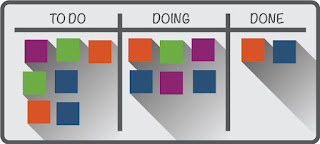Kan-ban, man
Many people in the workplace work under a system called kanban. It literally means "billboard" and looks a bit like this:
Lots of people really like it. There is nothing wrong with it, it can simplify things a lot. I happen to be one of those people who feel it is not a very great idea by itself, but instead needs policy and practical support to work right. I will explain why below.
First of all, a company that does not have a single, well-designed, universally accessible workflow system is at elevated risk. I don't care which flavor of work-flow system is used, I just care that there is exactly one system of record. If that system is designed along kanban lines (to do, doing, done), that is fine.
It may not capture the real complexities of the workplace, but it does give managers a chance to use an at-a-glance dashboard. Most managers are perpetually overwhelmed these days, and really need a way to have visibility into what their reports are doing. E-mail and other methods are inadequate.
Second, kanban does not address priorities. A system with a built-in, adjustable algorithm for ordering tasks, would be much better.
Where I have big problems with kanban comes in the following, all-too-common scenario. The workers actually have multiple places they must continuously check for work they have to do.
There is a ticket system (like Remedy), a request system (like HP's PPM), e-mail (Lord help us), an agile system (like Jira - a truly opaque and badly designed system if I have ever seen one), some kind of IM like Skype or SameTime, and, most irritating of all, drive-bys, where someone can come to your desk and verbally request work with absolutely no documentation at all, and get away with doing it.
Now add Kanban. You have to interrupt your extremely busy, interrupt-driven day, putting little stickies on a whiteboard so your management can see what you are doing.
I cannot adequately describe my feelings for such a policy. The board should be replaced with software.
Again, the simple notion of kanban is not bad at all. It's when you add in a ton of complexity with multiple systems of record where the individual contributors become as overwhelmed as the managers, that things get complicated. The fundamentals of business are ignored, and gaming the system becomes the highest priority of the workers. This is how kanban looks in real life:
It is a mess, and signifies chaos.
You think you are safe? Guess again. If your employees and contractors have to deal with an extremely complex system, and have significant hurdles just to get every day work done, your business risk is continually increasing.
Lots of people really like it. There is nothing wrong with it, it can simplify things a lot. I happen to be one of those people who feel it is not a very great idea by itself, but instead needs policy and practical support to work right. I will explain why below.
First of all, a company that does not have a single, well-designed, universally accessible workflow system is at elevated risk. I don't care which flavor of work-flow system is used, I just care that there is exactly one system of record. If that system is designed along kanban lines (to do, doing, done), that is fine.
It may not capture the real complexities of the workplace, but it does give managers a chance to use an at-a-glance dashboard. Most managers are perpetually overwhelmed these days, and really need a way to have visibility into what their reports are doing. E-mail and other methods are inadequate.
Second, kanban does not address priorities. A system with a built-in, adjustable algorithm for ordering tasks, would be much better.
Where I have big problems with kanban comes in the following, all-too-common scenario. The workers actually have multiple places they must continuously check for work they have to do.
There is a ticket system (like Remedy), a request system (like HP's PPM), e-mail (Lord help us), an agile system (like Jira - a truly opaque and badly designed system if I have ever seen one), some kind of IM like Skype or SameTime, and, most irritating of all, drive-bys, where someone can come to your desk and verbally request work with absolutely no documentation at all, and get away with doing it.
Now add Kanban. You have to interrupt your extremely busy, interrupt-driven day, putting little stickies on a whiteboard so your management can see what you are doing.
I cannot adequately describe my feelings for such a policy. The board should be replaced with software.
Again, the simple notion of kanban is not bad at all. It's when you add in a ton of complexity with multiple systems of record where the individual contributors become as overwhelmed as the managers, that things get complicated. The fundamentals of business are ignored, and gaming the system becomes the highest priority of the workers. This is how kanban looks in real life:
It is a mess, and signifies chaos.
You think you are safe? Guess again. If your employees and contractors have to deal with an extremely complex system, and have significant hurdles just to get every day work done, your business risk is continually increasing.


Comments
Post a Comment